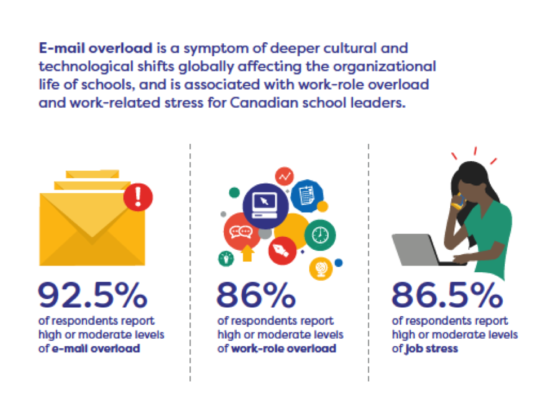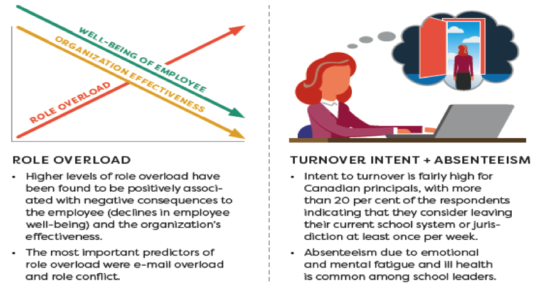The E-Principal
The Changing Work life of School Leaders
CANADA’S SCHOOL LEADERS report a seemingly paradoxical work life: while the career path of the principal is extremely rewarding, it is characterized by unsustainable hours of work, high levels of psychological demands and role overload. These conclusions are underscored in the 2017 report A National Study of the Impact of Electronic Communication on Canadian School Leaders, a study led by André Lanctôt and Linda Duxbury, both of Carleton University. This report was the first instalment of a two-phase collaborative effort sponsored by the Canadian Association of Principals (CAP) and undertaken by the Alberta Teachers’ Association (ATA). 1
This article examines the impact of electronic communications on the work of school leaders, drawing on the full report2 with the anticipation that readers will look to the published report for further context.
Email: A double-edged sword?
Why a study on email use? Simply put, electronic communication, such as email, has become the pervasive form of communication at work. One study of employed Internet users found that most employees feel email is very important for doing their job — more important than other forms of communication used in the workplace such as landline telephones, cellphones and social media sites.3
Some see email as a work tool that can help them balance work and family, while others see it as a taskmaster that never sleeps. But which is true? What is the link between the volume of emails a person processes per day and employee and organizational well-being? What is the link between the types of emails a person sends and receives and employee and organizational well-being? How can employees and organizations manage electronic communications to maximize the benefits of the technology while minimizing the drawbacks?
The study designed by Lanctôt and Duxbury aimed to improve our understanding of how principals evaluate and process work-related email, linking this email use to outcomes of interest to their school system or jurisdiction. Based on responses from 1,150 members of the CAP, the research team identified a complex relationship between email use and the growing role overload experienced by school leaders. Some of the highlights of the study:
- On average, school leaders send/receive 112 work-related emails each day, including 27 work-related emails from home.
- In their average 61-hour work week, a typical Canadian school leader spends 17 hours processing email, including 5.8 hours at home.
- The hours spent in email per week is a stronger predictor of email overload than the number of messages sent and received per week. 4
- Principals who spend 20 hours or more per week processing emails will likely experience high levels of email overload.
- 5 per cent of respondents report high or moderate levels of email overload.
- 86 per cent of respondents report high or moderate levels of work-role overload.
- 5 percent of respondents report high or moderate levels of job stress.
Citing a growing body of research from across the globe, the study concludes that email overload is a symptom of deeper cultural and technological shifts globally affecting the organizational life of schools, and is associated with work-role overload and work-related stress for Canadian school leaders.
Email overload has real implications for school leaders, affecting their well-being and their ability to do their jobs (see Figure 1 and Figure 2).
Figure 1 Figure 2


(source: graphics from the study’s summary document, You’ve Got Mail.)
School and system cultures are nested within the broader social milieu shaping the ecology of email use; consequently, change will require strong leadership and commitment from all levels of the organization. Managing expectations and norms at the individual and organizational levels is key, especially if one considers the following key indicators of work intensification:
- Nearly 90 percent of the sample reported high or moderate stress scores. Only 11 percent reported low levels of perceived stress.
- More than half of the CAP respondents consider leaving their organization at least once per month, and more than one in five consider leaving at least weekly.
Managing mail
The study uncovers a strong link between time spent on email and email overload. While the number of hours (17) per week that principals spend processing email is of interest, the real story here is that email overload contributes to outcomes associated with poor organizational health, since it is strongly associated with role overload and job stress.
Given these findings, the researchers suggest that school boards help principals manage the overload precipitated by email and, perhaps more importantly, address the organizational culture that tethers school leaders to tasks that do not enhance their capacity to do their work. They identify strategies for triaging electronic communications. These include both organizational and personal changes, ranging from establishing clear expectations and policies surrounding email use to individuals setting more parameters around the ways they monitor, answer and organize their emails.
The study’s recommendations reinforce a growing body of research on the work life of school leaders. For example, The Future of the Principalship in Canada: A National Study 5 found that the ubiquity of electronic communication tools was diminishing the quality of work life for principals in three key areas: the growing central management and surveillance of school operations, increasing expectations to be available 24/7, and the sometimes pernicious use of social media among students (and in some cases parents) that contributed to cyberbullying and the deterioration of school climates. Policy pronouncements about the role of principals as instructional leaders are problematic given that, in the same study, school leaders struggled to find six hours in a 56-hour workweek to spend time in classrooms or in contact with teachers. The study also found that 90 percent of Canada’s school leaders report significant levels of work-related stress.
A growing body of international research illustrates how email is indeed a double-edged sword. Email overload is symptomatic of broader international trends related to the ubiquity of electronic communication tools in the workplace. The proliferation of information and communication technologies, if ineffectively managed or regulated, can affect the health of workers across all sectors. For example, in the U.K., the amount of time people spend typing, texting, talking or gaming through smartphones, tablets and desktops is now more than time spent sleeping. Human capital experts argue that this constant supply of technology consumption can lead to decision paralysis due to increasing stress, and lower productivity as people manage a broader range of data and communications and are overwhelmed by feelings of never being able to disconnect from their work.
AS WE CONTINUE TO monitor and reflect on the work life of school leaders in increasingly digitally saturated environments, future research efforts ought to consider the complex ecologies of schools nested in communities where technology continues to grow in its influence. We must remain mindful, as Marshall McLuhan reminds us, that we shape our tools and then our tools shape us. Therefore, future research ought to be grounded by the recognition that optimal conditions of practice for school leaders are not only critical for their work-life balance, but ultimately extend benefits to student success and to the school-community that school leaders serve.
Resources
The full report, A National Study of the Impact of Electronic Communication on Canadian School Leaders, is available on the Alberta Teachers’ Association (ATA) website at www.teachers.ab.ca. Click on Publications> Education Research. Ordering information for print copies is available under Publications> Other Publications.
The ATA has undertaken a number of other research studies examining the changing conditions of practice for Alberta teachers and school leaders. The following studies can also be accessed at www.teachers.ab.ca. Click on Publications > Education Research.
- The Changing Nature of Teachers’ Work – Teaching and Learning Conditions in Alberta: A Global Perspective (2015)
- A Week in the Life of Alberta School Leaders (2014)
- Reflections on Teaching: Teacher Efficacy and the Professional Capital of Alberta Teachers (2014)
- The 2011/12 National Study on Balancing Work, Life and Caregiving in Canada: The Situation for Alberta Teachers (2013)
- The New Work of Teaching – A Case Study of the Worklife of Calgary Public Teachers (2012)
- Impact of Digital Technologies on Teachers Working in Flexible Learning Environments (2011)
Notes
1 A second study, The Canadian School Leader: Global Forces and Future Prospects, offers a broad analysis of the critical influences shaping the work life of school leaders, specifically focusing on the changing characteristics of Canadian society, the role of commercial interests in education, and district supports for technology, inclusion and professional development.
2 André Lanctôt and Linda Duxbury, A National Study of the Impact of Electronic Communication on Canadian School Leaders (Edmonton, AB: Alberta Teacher’s Association and Canadian Association of Principals, 2017). (Special thanks to Dr. Lindsay Yakimyshyn of the Alberta Teachers’ Association, who shepherded the report through to publication.)
3 K. Purcell and L. Rainie, Technology’s Impact on Workers (PEW Research Center: Internet Science & Technology. www.pewinternet.org/2014/12/30/technologys-impact-on-workers/.
4 Email overload is a type of information overload: “a condition in which the volume of information exceeds a person’s capacity to process it.” (Thomas et al., 2006).
5 Alberta Teachers’ Association (ATA), The Future of the Principalship in Canada: A National Research Study (Edmonton, AB: ATA, 2014), p. 11.
Images: courtesy Alberta Teachers’ Association
